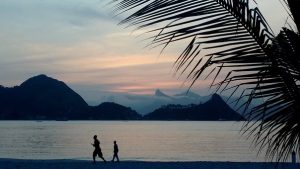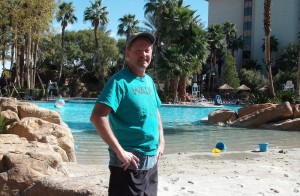 Lounging at the pool, a tall sweet beverage at your side, the last thing on your mind probably is staying in shape. After all, nutrition and exercise involve work, right? And wasn’t work what you’re escaping from for a week?
Lounging at the pool, a tall sweet beverage at your side, the last thing on your mind probably is staying in shape. After all, nutrition and exercise involve work, right? And wasn’t work what you’re escaping from for a week?
Turns out those activities can co-exist. So says Dr. Zach Paul. Paul and two colleagues serve patients at Brookfield Chiropractic in Brookfield, Wis. He explains that the proper regimen before, during and after a trip can help keep that vacation enjoyable.
A big issue with vacationers, Paul says, is simply overeating. “When we over-eat, our digestion system is already on overload,” he says. While in another country, “you’re introducing basically a whole new culture into your body.” Spices and herbs can effect travelers not accustomed to those foods. Couple that with quantities of alcohol typically consumed while on vacation, and digestion issues arise.
Though a doctor of chiropractic, Paul’s background is quite varied. He has undergraduate degrees in human biology and life science. Paul is a certified chiropractic sports physician and Level 1 CrossFit trainer. And he holds state certification in nutritional consulting, and has taught college courses in a variety of health-related topics. As a result of this training and experience, Paul emphasizes whole-body care, including nutrition and exercise.
Prepping for your vacation starts with supplements and probiotics. “Probiotics are types of supplements that basically help you, give you the good bugs for your digestion tract,” he explains. Pack those, along with any other supplements or multi-vitamins you are taking. They may not be available on the ship or at the resort.
Stay in shape while on vacation
Exercising while on vacation doesn’t have to involved fancy equipment and an exercise room (though those are useful if available). Indeed, you can incorporate at least one activity, walking, into any vacation you take. Paul cautions that some exercises are age-dependent. A younger, more active body can withstand compression better than an older one. Consult your doctor for any further advice.
Also be careful about increasing your exercising. At least initially, hold to the 10% rule: Increase only by about 10% above your routine. And stop if any activity causes pain. “Don’t ruin your vacation by exercising; you don’t need to get injured,” Paul says.
The following exercises are free, easy to do, and can be performed just about anywhere.
Walking: “Walking is huge,” Paul says. It’s already a part of your vacation, because you’re on the go anyway, right? (At least most of the time.) In addition to helping you burn calories, walking is good for the spine. “The body needs motion; it needs movement,” Paul explains. “One of the worst things you can do on your vacation is not move.”
Instead of calculating distances, Paul suggests timing your walks: 15-20 minutes is a good start. The key with any exercise is to be careful of extending yourself. Paul says that if you have a desk job but suddenly start walking 4 to 5 hours a day while on vacation, “you’re going to pay for that.”
It doesn’t matter where or why you’re walking. Taking a cruise? You’ll walk a lot just getting from one room to another. Excursions and sight-seeing trips also involve walking. And they offer a double bonus: you experience something new and get in some exercise.
Jumping rope: Great cardiovascular workout. For a real challenge, try a “double-under.” With each jump, try to get the rope to swing under you two times. “If you do that for about 10 minutes, you have yourself a pretty significant workout,” Paul says.
Sit-ups: Good exercise as long as your spine can take the bending.
Planks: Hold yourself in the extended (push-up) position and time yourself. Strive for 15-30 second each rep, and keep your abdominal muscles tight for maximum benefit.
Burpees: You go from a standing position to the floor to do a push-up, then jump up. Repeat. Younger and more experienced will do these must faster. Take your time if you’re older. The key is to go through the various steps. Done well, these are very effective, because they get the heart rate going, Paul says.
As for reps, Paul says it’s difficult to offer a generalization. Exercising is personalized; everyone is in a different physical condition and experience level. For starters, he suggests 3 reps of 10.
Simple stretching exercises reduce stress throughout your day
Nutrition tips for your vacation
Can watching what you eat really be enjoyable (or at least tolerable)? Absolutely, Paul says. He suggests you “pick your moments.” Because your metabolism is higher during the day, Paul recommends consuming the majority of your calories during the day. Cut back at night.
Enjoy those snacks or dessert, but during lunchtime. Schedule a nutritious meal on occasion, making sure you consume fruits and vegetables. “One thing we know about fruits and vegetables, regardless of where we’re at, [is] they provide your body with so many healthy things.”
One practice Paul would like to dispense with is calorie counting. He’s not against it, per se; jussgt need to put it in perspective. “If we consume a thousand calories of broccoli and we consume a thousand calories of Skittles,” he asks, “is that going to have the same impact on the body? The answer is, absolutely not.”
Calorie counting is a “piece of the pie” (no pun intended!), Paul says, but should not be a person’s only focus. You must consider the source of the calories. In the example above, broccoli offers much more nutritional value than does candy. “[Calorie counting] may be effective from a vacation standpoint, but it’s not effective to go beyond that.”
He notes that vacationers tend to consume foods high in refined sugar. Refined sugar affects the body from both a nutritional and energy standpoint. Watch for starch, too. You’ll find that in corn, potatoes and rice, for example. A solution is to include fruits and vegetables with every meal. “Then, you’ll feel full faster, and ultimately, you won’t have that tendency to over indulge,” he says. Bottom line: “Get off the refined sugar!”
Once home, ease your way back into your regular diet. “If you give your body too much, initially,” Paul says, “it’ll be a stress on your system.” Continue with your probiotics and vitamin supplements (if taken). Consume smaller portions during those first few days, and spread out the meals. Doing so will ensure your digestion system isn’t overloaded and that you can maintain your energy levels throughout the day.
As you board that jet for 8 days of blissful relaxation, remember that you can have your cake and eat it, too. Just do so during lunch. Then take a nice long stroll down the beach.
Do you have some tips for enjoying a healthy vacation? Feel free to comment below. And if you found value in this post, please share it with others. You may use any of the buttons at left.

Tom Fuszard
New Berlin, Wisconsin
Tom@RestAndRelax.us
Follow me on Twitter.
Follow my Facebook page. (You may need to log in.)
Image courtesy of Pixabay.com.
No Responses